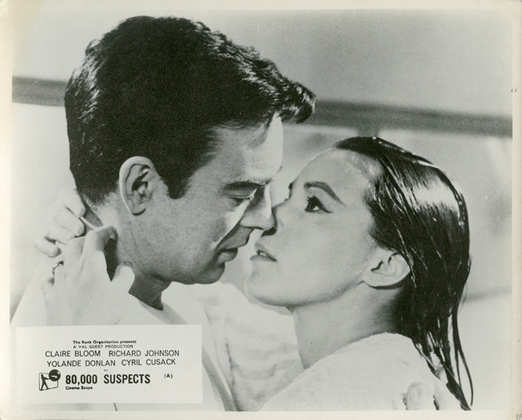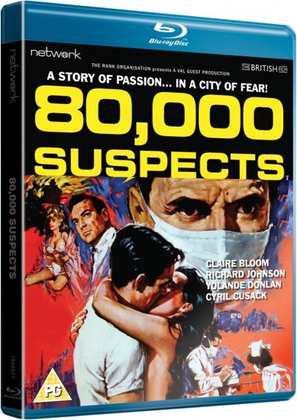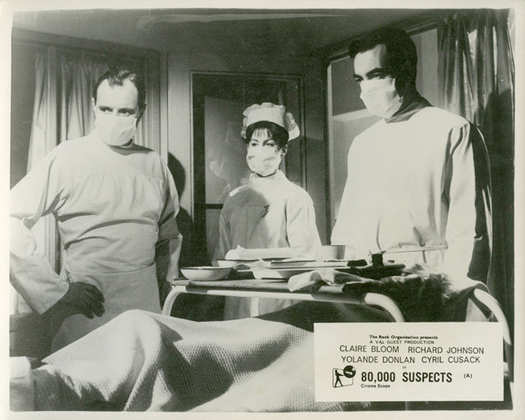Review for 80,000 Suspects
’80,000 Suspects’, based on the movie poster and trailer, looks like a pretty exciting ‘plague’ thriller where a mystery disease (smallpox) is blighting the City of Bath, threatening to remain un-contained and potentially affect the whole nation. But that description is only partially true as it’s also a pot-boiling melodrama, a combination not necessarily made in heaven.
It was written, produced and directed in 1963 by Val Guest, a stalwart of classic British films (including fourteen for Hammer) and TV (including directing episodes of The Persuaders and Space 1999). He also (in)famously directed a number of sex-comedies in the mid-seventies including ‘Confessions of a Window Cleaner’. ’80,000 Suspects’ was release just two years after Guest's ‘The Day the Earth Caught Fire’, arguably one of the best Sci-Fi films to come out of Britain at the time, and stylistically it shares the quasi-documentary feel of that film. It’s been posited that ’80,000 Suspects’ was a British homage to one of his key influence’s films, Elia Kazan’s ‘Panic in the Streets’ from 1951 which had a very similar narrative theme.
The film looks akin to ‘The Day the Earth Caught Fire’ with its gritty black and white footage, often shot with a moving camera in real locations rather than confined to studio sets.
Richard Johnson and Claire Bloom (who starred together in The Haunting) star as a Doctor (Steven Monks) and his wife who we see initially at a New Year’s Eve party which is also the first day of some much needed leave. But before the leave can begin, he has to drop off the highly inebriated and promiscuous wife of an on-duty colleague who has come to the party on her own (played by Guest’s own wife, Yolande Donlan whose fading beauty perfectly fits the role). It becomes clear that she and Steven have some history – probably an affair although this isn’t specified at the time. This slow-start to the film appears at first to be something of a red herring, prior to the inevitable action. Disappointingly this dreary sub-plot is returned to again and again, a flaw in the writing and possibly one of the problems of a director doubling as writer and feeling an obligation to beef up his wife’s role in the early part of the film, as well as its narrative follow-up throughout.
After he drops off his colleague’s wife, with a promise to return to his own, he visits the hospital to pick up a camera he has lent a colleague. But when he gets there he’s drawn into helping with an emergency and what looks like it could be a case of smallpox. When a second case is reported the following day it’s feared there’ll be an outbreak and all medical leave is cancelled. It’s a case of all-hands to the deck and even Steven’s ex-Nurse wife reports back to duty.
Cue ninety minutes of soul searching about a potentially broken marriage (Steven’s own, spoiled through the veil of dishonesty brought on through the affair) as well as trying to track down and contain the source of the virus before it consumes the country.
Despite some reasonably convincing performances and some stunning cinematography, the film inches along without ever gaining the sort of momentum one would expect in such a film. It’s perfectly watchable but just fails to ignite.
The melodrama, which would be more at home in a hospital soap, which includes a soul searching conversation in the shower with a catholic priest (these were far more innocent times) were, for me, a bit tedious and rather than adding atmosphere and depth, merely detracted from what could have been a great story. Guest eventually directed all three Hammer Quatermass films and it’s a reals shame this film didn’t maintain the single-minded focus of those. It would have been all the better for it.
On the plus side, the cinematography is great and this transfer is stunning – quite the best you’re likely to see it, re-mastered from the original negatives. (I would have given the film a luke-warm 6 but added an extra point for this – thank you fine folk at Network!).
It was also great to see Bath as it was in the early 60’s, filmed during the cold and snowy winter of ’63. The Roman Abbey and pump rooms are used extensively in the opening scenes for the party and look relatively unchanged to this day.
I guess the film may also have been considered slightly racy at the time as there are many references to sex and even some slight flashes of nudity, though not enough to make even the most prudish among you blush today.
Also the leads are both played well despite some fairly turgid dialogue. Indeed, the entire cast can be forgiven for making the best of it.
Extra features include an image gallery, some press and publicity materials as PDF’s and a booklet, which I haven’t seen, penned by Professor Neil Sinyard, film historian and Professor at Hull University.
Fans of British cinema will want to add this to their collections of course, but should be steeled for slight disappointment along with the thrill of seeing a vintage film in such fine fettle.



Your Opinions and Comments
Be the first to post a comment!